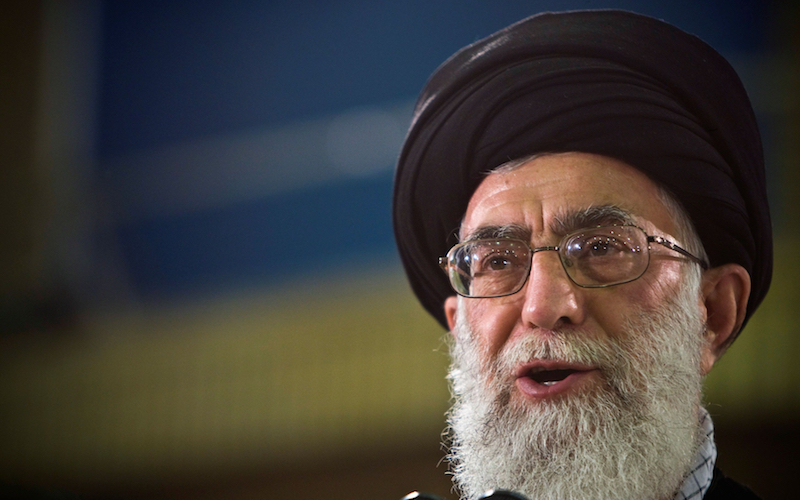
Revolution and Evolution: Supra-Nationalism and Pragmatism in Iran’s Foreign Policy
The election of Donald Trump has led to Iran-US relations plummeting quickly. The president’s newly minted administration has spent its first few weeks trading threats, insults, travel bans and diplomatic actions, raising concerns that the nuclear deal brokered by the Obama administration may be cast aside by both states as an act of defiance.
Unquestionably the fog that surrounds Trump’s decision making and foreign policy as well as Iran’s reactionary tendencies have created a sense of trepidation and ambiguity about the new chapter in US-Iran relations. Attempting to understand a potential shift will require a closer inspection of the machinations that drive Iran’s foreign policy
A closer look at the history of Iran’s foreign policy since the establishment of the Islamic Republic in 1979 indicates a pendulum like trend of behavior. This spectrum of behavior ranges from the total rejection of the current Westphalian system of international relations based on Islamic supra-nationalist ideologies in the early 1980’s to desperate attempts to be accepted as a part of this system as mirrored in Iran’s nuclear deal. The source of such a paradox is rooted in the disintegrated approach of Iran towards the world. On one hand, Iran is trying its best to remain loyal to its ideological revolutionary principles while on the other hand, as a member of the international community it needs to adhere to the current world order. This paradox can be best understood from a historical perspective.
In the first decade of its establishment and under the leadership of Ayatollah Khomeini, the Islamic Republic denied most of the globally accepted phenomena of international relations such as national government, national interests, international institutions, international laws and geo-political patterns of power. In this stage, establishing a utopic Islamic state was the main goal of the revolutionary regime.
Concepts such as national interests or international cooperation were viewed as taboos and in contrast with Islamic principles and values. In line with this approach, the US embassy in Tehran was occupied by the revolutionaries in 1979 and the American diplomates were taken hostage for 444 days. Iran rejected the globally respected notion of diplomatic immunity and called American diplomats spies and the embassy, an espionage den. Ayatollah Khomeini endorsed the occupation of the embassy by calling it the second revolution. November 4th (the day the US embassy was occupied) is marked in the Islamic Republic of Iran calendar as the Anti-imperialism Day.
However, in the second decade of the revolution and during the reformist President Khatami (1997-2005), Iran gradually shifted its confrontational foreign policy towards a more accommodating stance. In this period, the United Nations accepted Iran’s suggestion of calling the year 2001 as the year of dialogue among civilizations. In a symbolic interview with CNN in 1998, President Khatami referred to the 1979 US diplomat’s hostage crisis in Tehran as an event which hurt the feelings of the great American people and that he regretted the incident. Nevertheless, the shift in Iran’s foreign policy towards conciliation with the international community did not reach a tangible conclusion.
Through the election of President Ahmadinejad (2005-2013), Iran once again shifted its foreign policy towards confronting the international community. The movement was lauded as returning to the fundamental principles of the Islamic revolution. In 2005 and in a public statement, President Ahmadinejad called for Israel to be wiped off the map and referred to the Holocaust as a myth. Also during his presidency, the British Embassy in Tehran was stormed by protesters in November 2011 and was occupied for a few hours by them. The attack was condemned by the UN and the EU in the strongest of terms.
In line with this pendulum like trend of behavior, Iran’s foreign policy has once again shifted towards reconciliation with the world upon the election of President Rouhani in 2013. The greatest achievement of his foreign policy is certainly the Iran Deal over the country’s ambitious nuclear program with the world community. However, even the relatively moderate foreign policy of President Rouhani could not prevent events such as the 2016 attacks on the Saudi diplomatic missions in Tehran and Mashhad which resulted in Saudi Arabia calling off its diplomatic ties with Iran.
The cause of such drastic convergence and divergence in Iran’s foreign policy is rooted in its paradoxical ideological approach. Iran’s foreign policy tends to accommodate both Islamic supra-nationalism and pragmatism at the same time within its structure. To achieve this goal, an ideological interpretation of “expediency” is manipulated by Iran to ensure the survival of the Islamic state. In the complicated structure of Iranian foreign policy, expediency can be accurately interpreted as nothing less than a cost-benefit approach to decision making. This approach posits that until the survival of the state is at threat, Iran bases its initial foreign policy on Islamic supra-nationalist objectives instead of pragmatic ones within the Westphalian system. However, when such a threat materializes, Iran retreats from its initial ideological fervor in favor of adopting pragmatic approaches (recognizing the Westphalian system). At this point, it is prepared to either covertly or overtly negotiate its idealist objectives – often abandoning them altogether.
As long as Iran does not confront survival threats at the international level, it continues to pursue its supra-nationalistic, ideologically bound foreign policy. In this phase, the ruling elites – consisting of the ruling political administration as well as the military and security apparatus, are primarily responsible for achieving the state’s ideological foreign policy.
This approach was evident in Iran’s foreign policy during President Obama’s administration. As Tehran was confident that the US Democrat administration was not willing to re-initiate a military intervention in the Middle East, the country rapidly expanded its influence among its Arab neighbors namely Iraq, Syria, Bahrain, and Yemen by supporting the Shi’a minorities in these countries. The Islamic Revolutionary Guards’ (IRGC) attack boats harassed the US navy fleet several times in the Persian Gulf with confidence that there would be no severe retaliation from the US side. There are also reports indicating that President Obama had agreed with IRGC’s missile program as long as the ranges of the missiles were kept below 2000 km.
However, upon facing conditions that threaten the survival of the state, the state adopts a more flexible attitude whereby its foreign policy decisions become more pragmatic. The degree of the State’s flexibility is in direct relation with the severity and proximity of the threat to the state’s survival. This pattern was especially tangible in Iran’s foreign policy approach towards its nuclear negotiations with the world community by 2013 and the start of Rouhani’s presidency where Tehran found its state survival in immediate danger under the crippling international sanctions. As a result, Iran returned to the negotiation table with the international community and engaged in direct talks with the US for the first time since 1979. It is apparent that in this period of time, the Islamic supra-nationalist principles were halted in favor of the Westphalian values.
The same pattern of behavior can be viewed in Iran’s foreign policy towards Trump’s America. While Iran was never shy in showing off its military capabilities publicly during Obama’s presidency, the country has reduced such activities and softened its tone upon receiving strong and firm warnings from the new administration in the US. Confirmed reports indicate that IRGC stopped testing its satellite carrier missile, Safir, in February 2017 after a public warning from the US. The halt in testing the missile due to the warnings from the US was confirmed by the IRGC Aerospace Force Commander Amir Ali Hajizadeh in an interview in Tehran.
Such incidents indicate that the severity of external threats to the survival of the Iranian state is a key element in shaping it’s choice between supra-nationalist ideology and pragmatism in its foreign policy.

